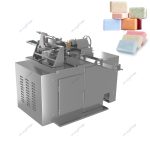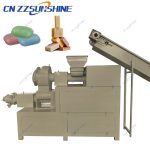Demand for high-quality bar soaps, both laundry and toilet varieties, continues to drive investment in robust, automated manufacturing solutions. A modern industrial soap making production line integrates specialized machinery to transform raw materials into finished bars efficiently, consistently, and at scale. Understanding the core components and their synergy is key for manufacturers seeking reliability and optimal output.
The process fundamentally begins with thorough mixing. An industrial mixer for chemical processing, often a sigma or paddle type, is essential for combining fats, oils, alkalis, additives, and fragrances into a homogeneous soap base. This stage demands equipment capable of handling varying viscosities and ensuring complete, uniform integration – critical for final product quality. Following mixing, the soap mixture (or ‘noodles’) moves to the refining stage. Here, a three roller mill for cosmetics or soap applications refines the texture, removing any grit or lumps and creating a smooth, uniform paste ready for extrusion. This milling step is vital for premium toilet soap finishing lines and cosmetic bars where a silky feel is paramount.
The heart of extrusion lies with the soap plodder machine. Typically, a vacuum plodder is employed. This crucial component compresses the milled soap under vacuum, removing trapped air that can cause bubbles or cracking in the final bar. The vacuum plodder continuously extrudes a solid, dense log of soap (or multiple logs) with consistent density and diameter, ready for shaping. Downstream, the extruded soap log enters the cutting phase. An automatic soap cutting machine, often an electric washing soap cutter, slices the continuous log into precise, individual bar slugs or blanks at high speed. For specialized shapes or intricate designs, a custom soap cutting machine provides the necessary flexibility.
Finally, the cut bars proceed through stamping, cooling (potentially using an industrial chiller for machinery if required), drying, and packaging – often involving an automatic packing machine for food-grade standards. Leading manufacturers, particularly competitive China feed processing machine suppliers expanding into soap tech, offer comprehensive solutions. From compact laundry bar soap production lines to sophisticated bath soap making machines for premium segments, the focus is on high throughput, minimal waste, and adaptability. Key advantages include the ability to handle diverse recipes, quick changeovers between product types (like switching from laundry to toilet soap finishing line configurations), and integration capabilities for fully automatic soap production lines. Investing in a well-designed line, featuring a high-performance vacuum plodder, efficient soap mixer, and precise cutter, translates directly to superior product consistency and reduced operational costs.





